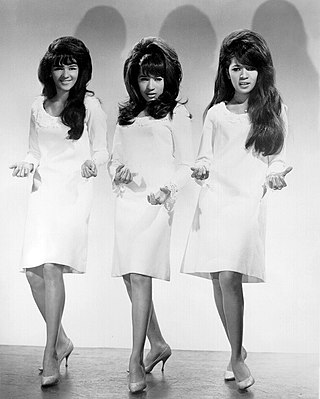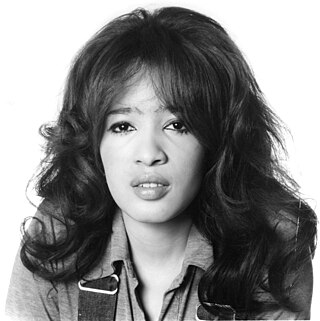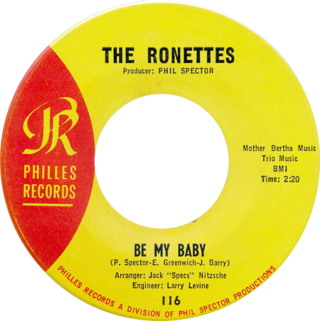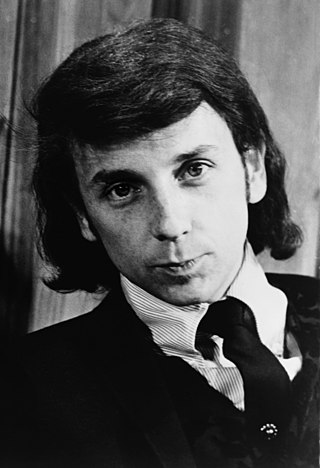
The Ronettes were an American girl group from Washington Heights, Manhattan, New York City. The group consisted of lead singer Veronica Bennett, her older sister Estelle Bennett, and their cousin Nedra Talley. They had sung together since they were teenagers, then known as "The Darling Sisters". Signed first by Colpix Records in 1961, they moved to Phil Spector's Philles Records in March 1963 and changed their name to "The Ronettes".

Veronica Yvette "Ronnie" Greenfield was an American singer who co-founded and fronted the girl group the Ronettes. She is sometimes referred to as the original "bad girl of rock and roll".

"Come See About Me" is a 1964 song recorded by the Supremes for the Motown label. The track opens with a fade-in, marking one of the first times the technique had been used on a studio recording.

"Love Child" is a 1968 song released by the Motown label for Diana Ross & the Supremes. The second single and title track from their album Love Child, it became the Supremes' 11th number-one single in the United States, where it sold 500,000 copies in its first week and 2 million copies by year's end.

"River Deep – Mountain High" is a song by Ike & Tina Turner released on Philles Records as the title track to their 1966 studio album. Produced by Phil Spector and written by Spector, Jeff Barry and Ellie Greenwich. Rolling Stone ranked "River Deep – Mountain High" No. 33 on their list of the 500 Greatest Songs of All Time. NME ranked it No. 37 on their list of the 500 Greatest Songs of All Time. The Rock and Roll Hall of Fame added it to the list of the 500 Songs That Shaped Rock and Roll. The song was inducted into the Grammy Hall of Fame in 1999.

"Be My Baby" is a song by American girl group the Ronettes that was released as a single on Philles Records in August 1963. Written by Jeff Barry, Ellie Greenwich, and Phil Spector, the song was the Ronettes' biggest hit, reaching number 2 in the U.S. and number 4 in the UK. It is often ranked as among the best songs of the 1960s, and has been regarded by some publications as one of the greatest songs of all time.

"Don't Worry Baby" is a song by American rock band the Beach Boys from their March 1964 album Shut Down Volume 2. Written by Brian Wilson and Roger Christian, Wilson's lead vocal on the track is considered one of his defining performances, and he later referred to "Don't Worry Baby" as perhaps the Beach Boys' finest record. It was issued in May 1964 as the B-side of "I Get Around", and charted separately at number 24.

"I Can Hear Music" is a song written by Jeff Barry, Ellie Greenwich and Phil Spector for American girl group the Ronettes in 1966. This version spent one week on the Billboard Pop chart at number 100. In early 1969, the Beach Boys released a cover version as a single from their album 20/20 (1969), peaking at number 24 in the US.

Barbra Streisand is an American actress and singer. Her discography consists of 118 singles, 36 studio albums, 12 compilations, 11 live albums, and 15 soundtracks. According to the Recording Industry Association of America, Streisand is the second-best-selling female album artist in the United States with 68.5 million certified albums in the country, and a career total ranging from 150 to 200 million making her one of the best-selling music artists of all time.

"More Love" is a 1967 hit single recorded by the American soul group The Miracles for Motown Records' Tamla label. The single, included on the group's 1967 album Make It Happen, later reissued in 1970 as The Tears of a Clown. Kim Carnes's 1980 cover of the song reached the Top 10 of Billboard's Adult Contemporary and Hot 100 charts.

"Take Me Home Tonight" is a song by American rock singer Eddie Money. It was released in August 1986 as the lead single from his album Can't Hold Back. The song's chorus interpolates the Ronettes' 1963 hit "Be My Baby", with original vocalist Ronnie Spector providing uncredited vocals and reprising her role. Songwriting credit was given to Mike Leeson, Peter Vale, Ellie Greenwich, Phil Spector and Jeff Barry.

"Nothing but Heartaches" is a 1965 song recorded by The Supremes for the Motown label.

Harvey Phillip "Phil" Spector was an American record producer and songwriter best known for his innovative recording practices and entrepreneurship in the 1960s and his two trials and conviction for murder in the 2000s. Spector developed the Wall of Sound, a production style that is characterized for its diffusion of tone colors and dense orchestral sound, which he described as a "Wagnerian" approach to rock and roll. He is widely regarded as one of the most influential figures in pop music history and one of the most successful producers of the 1960s.

"(The Best Part of) Breakin' Up" is a song written by Phil Spector, Pete Andreoli and Vince Poncia. It was first recorded by the Ronettes, produced by Phil Spector and arranged by Jack Nitzsche with Ronnie Spector on lead vocals and with backing vocals by Nedra Talley and Estelle Bennett, ably abetted by Darlene Love and the Blossoms, Bobby Sheen, and Sonny & Cher. The song was released in April 1964, the year widely recognized as the group's most successful year, and proved to be the group's third consecutive top forty hit in the US. The single peaked at number 39 on the U.S. Billboard Hot 100 and number 43 on the UK Singles Chart.

"Is This What I Get for Loving You?" is a pop song written by Phil Spector, Carole King and Gerry Goffin and recorded by 1960s girl group The Ronettes. The song featured Ronettes lead singer Ronnie Spector on lead vocals, and Ronettes Nedra Talley and Estelle Bennett on backing vocals. Released on Philles Records, reaching No. 75 on the Billboard Hot 100 in 1965.
This article is a discography for American singing group The Ronettes. The Ronettes began recording with Colpix Records in 1961 and recorded eleven songs for Colpix. In March 1963, the group moved to Phil Spector's Philles Records, where they achieved their biggest success.

Wax Museum is the eighth studio album by Jay and the Americans released on February 28, 1970. The album went to #105 on the Billboard 200 chart, reached #68 on the Cashbox chart, and #71 in Canada. The album was the group's last charting album.

"He's Sure the Boy I Love" is a 1962 single by The Crystals. It was originally recorded by The Blossoms but credited to The Crystals. On the Billboard charts in 1963, "He's Sure the Boy I Love" peaked at No.11 on the Billboard Hot 100 and No.18 on the Hot R&B Singles.

Unfinished Business is the second studio album by American singer Ronnie Spector, released in 1987.

"Do I Love You?" is a song written by Phil Spector, Pete Andreoli and Vini Poncia. It was recorded by American girl group the Ronettes in 1964 and released on their debut album Presenting the Fabulous Ronettes.





















